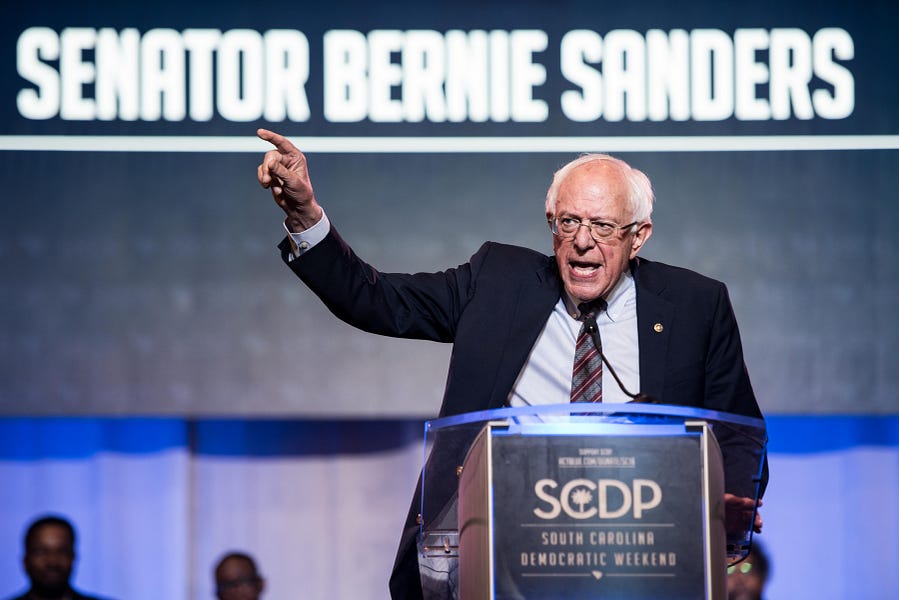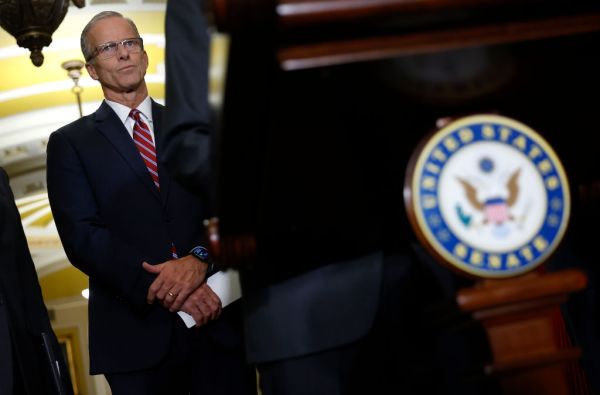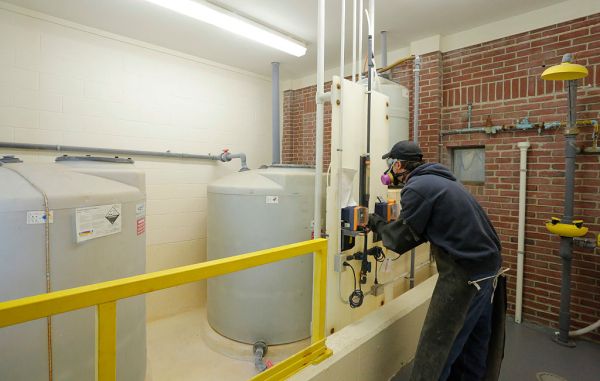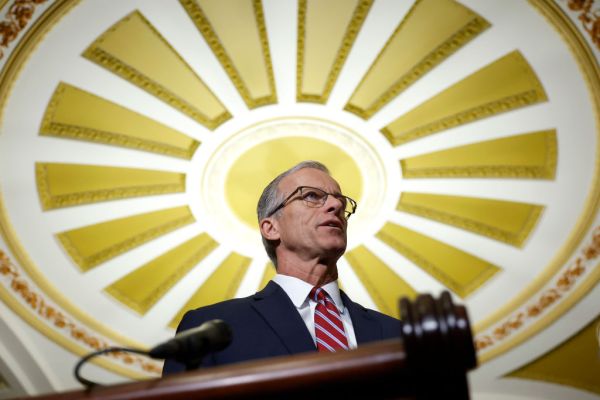By and large, Republicans are missing out on the zany fun of primary season. Donald Trump’s primary victory nearly tore the party apart in 2016; this time around, he enjoys overwhelming support among Republicans, and—with apologies to Bill Weld and Joe Walsh—lacks any serious primary threat. (Delegate counts after the Iowa primary: Trump 97, Weld 1, Walsh 0.) Just to be on the safe side, seven states—Kansas, Nevada, South Carolina, Arizona, Alaska, Virginia, and Hawaii—canceled their presidential caucuses and primaries late last year.
Under such circumstances, what are Republicans to do to get their political fix? In at least a few cases, they’re taking a joyride into the Democrats’ primary process. This week, we’ve seen Republicans plotting to sow primary mayhem of one sort or another among Democrats in three separate races.
In South Carolina, which has open primaries and where the GOP canceled its own, a group of state GOP officials have decided to encourage their supporters to vote for Sen. Bernie Sanders, who, in the words of Greenville GOP Chairman Nate Leupp, is “the most socialistic, liberal candidate” in the race. The intent is both to help the primary chances of a candidate they feel will likely match up poorly against Trump and to demonstrate why the state should move to a closed primary.
In North Carolina, a GOP PAC called Faith and Power is spending upward of $1 million on ads supporting Senate candidate Erica Smith—a state senator waging an upstart campaign against establishment pick Cal Cunningham. The ad brags that Smith is the only candidate “endorsed by progressives and unions,” calls her “the No. 1 supporter of the Green New Deal,” and insists she is the race’s “only proven progressive.” Faith and Power hasn’t said anything publicly, but the aim is clearly to drag out the primary, to the benefit of GOP incumbent Thom Tillis in the general.
And the Iowa Democratic Party said Thursday that its troubles collecting and reporting the results of its caucus—which have caused a days-long national scandal—stemmed in part from Trump supporters who coordinated online to swarm the reporting hotline with prank calls supporting the president.
These various efforts—led, respectively, by GOP state politicians, GOP strategists, and a GOP-supporting online gang—underscore the degree to which Republican voters increasingly see politics as a zero-sum game in which a weaker Democratic party translates directly to a stronger America. Unsurprisingly, Democrats aren’t thrilled by the overtures.
“I definitely think it’s tacky and sloppy,” said Antjuan Seawright, a Democratic strategist from South Carolina. “I think that Republicans have gotten bold with wanting to interfere and influence elections for their own benefit.”
For campaigns to meddle in each other’s primaries isn’t new, although it isn’t exactly common. The most notable example came in 2012, when Missouri’s embattled Democratic Sen. Claire McCaskill cut faux-attack ads on Republican challenger Todd Akin during his primary, which blasted him as “too conservative.” The ads worked: Akin won the primary, then promptly imploded in the general, and McCaskill punched her ticket to another term in D.C.
For the original deployment of the strategy, many people point to California governor’s race in 2002. In that race, unpopular Democratic incumbent Gray Davis managed to win re-election by torpedoing the strongest Republican opponent, Richard Riordan, in his primary, spending millions on ads pointing out Riordan’s flip-flopping history on abortion policy.
“What Riordan chose to do was run in the primary against Governor Davis, acting like this was a general election campaign, ignoring his Republican opponents, running ads against Governor Davis, shooting his mouth off about Governor Davis, and acting as if he was already the Republican nominee,” Garry South, who ran the Davis campaign that year, told The Dispatch. “So we said, okay, if he wants to play that game, we’ll run in the primary against him.”
“I’ve been doing campaigns for 40 years, including presidential and gubernatorial and U.S. Senate,” South added. “I had never seen a candidate slide down the pole like a greased pig as fast as Riordan did when we started going after him on the air. … The day after the election, one of my clients sent me two big sprays of flowers exactly alike, and I thought, ‘Oh, that must be a mistake in the flower shop.’ But they both had little cards on them, and envelopes. And so I opened one and it said, ‘Congratulations on winning the Democratic primary.’ And I opened the other one and it said, ‘Congratulations on winning the Republican primary.’”
As a practitioner of similar strategies himself, South said he didn’t have much of an issue with the Carolinians’ schemes.
“I do think there’s a little bit of ‘all’s fair in love and war’ about it,” he said. “Every candidate who is running for public office, at every level—president, U.S. senator, governor—is trying to navigate their way through the electoral process and figure out how they give themselves the best odds of winning. And if that involves some sort of, you know, misdirection in a way, I don’t think that’s necessarily dirty pool.” He added that he was much more concerned about systemic issues like voter suppression.
In a certain sense, then, Republicans this cycle have only been dipping back into some Democrats’ old bag of tricks. But there’s also a crucial difference about the South Carolina and Iowa schemes. Rather than simply shaping the narrative of a campaign behind the scenes, both require active grassroots buy-in: from the pranksters carrying out the calls in Iowa, or from the voters persuaded to go vote for Sanders in South Carolina. In other words, where political dirty tricks were once carried out quietly by canny political professionals, now they can take place out in the open, performed by the voters themselves.
But will it be useful? That’s harder to say. In the South Carolina case, where Republicans hope to help push Bernie Sanders over the top, there’s a certain sense that Republicans should be careful what they wish for.
“I think there’s a conventional wisdom generally, if not among Republicans, that a Sanders nomination presents an easier path for Trump, but also throws a real grenade into the Democrat party. The potential for fissures to develop within the party is probably pretty substantial,” said Republican strategist Rob Stutzman. “But, you know, what ends up being true is often counter to what conventional wisdom is. Trump supporters of all people should be aware of that.”
Photograph of Bernie Sanders by by Sean Rayford/Getty Images.






Please note that we at The Dispatch hold ourselves, our work, and our commenters to a higher standard than other places on the internet. We welcome comments that foster genuine debate or discussion—including comments critical of us or our work—but responses that include ad hominem attacks on fellow Dispatch members or are intended to stoke fear and anger may be moderated.
You are currently using a limited time guest pass and do not have access to commenting. Consider subscribing to join the conversation.
With your membership, you only have the ability to comment on The Morning Dispatch articles. Consider upgrading to join the conversation everywhere.